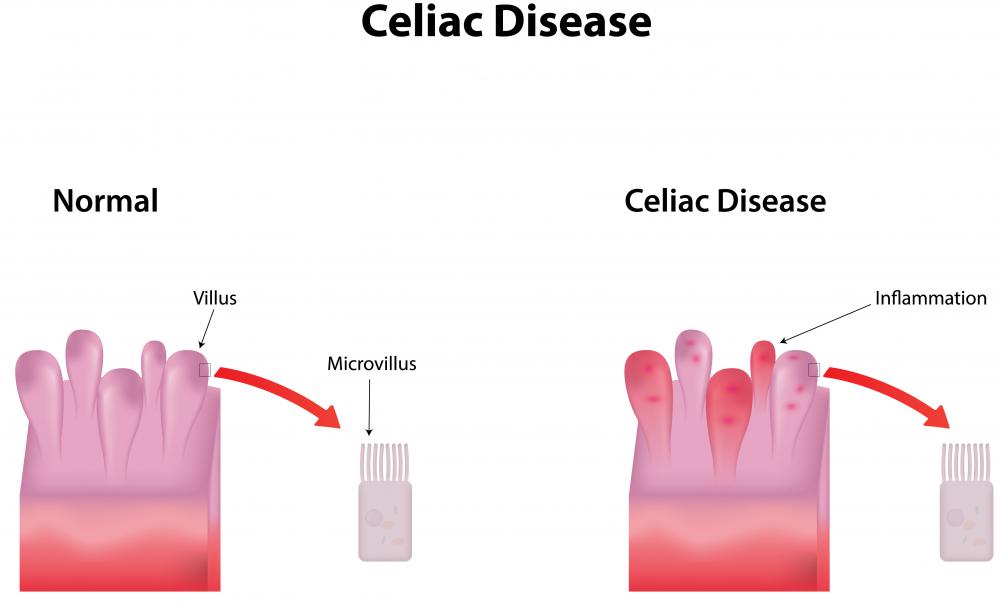At WiseGEEK, we're committed to delivering accurate, trustworthy information. Our expert-authored content is rigorously fact-checked and sourced from credible authorities. Discover how we uphold the highest standards in providing you with reliable knowledge.
What Is the Connection between Gluten and Diabetes?
Gluten and diabetes are connected in two ways. Individuals with type one diabetes are at a higher chance of having Celiac disease, a condition that makes a person gluten-intolerant. For individuals with type two diabetes, restricting the consumption of foods containing gluten has shown positive results in improving overall health. Reducing or eliminating gluten from one's diet should only be a part of a broader diabetes treatment plan that one creates with the assistance of a physician.
Since the beginning of agriculture, gluten has been part of the human diet. Gluten is a protein found in wheat and wheat-based products. In bread, it is the part of wheat that allows the dough to rise and keep its shape during fermentation. Though its role has been important in human history, the wheat-based products where it resides have added to the obesity epidemic. Products such as bread cause blood glucose levels to spike. Constant spikes in blood glucose can lead to type two diabetes, a condition where the body is resistant to the effects of insulin produced by the pancreas.

Type one diabetes, on the other hand, is an autoimmune disorder, and has nothing to do with eating carbohydrates or sugar. The body attacks itself and destroys the insulin-producing cells within the pancreas. The connection between gluten and diabetes in this case is that roughly 10% of type one diabetics have Celiac disease, another autoimmune disorder that makes them gluten-intolerant. With Celiac disease, one experiences severe gastrointestinal sickness after eating anything containing gluten. As of 2011, the medical community is still researching the relationship between these two disorders in the hopes of finding cures for both.

Besides taking medication, one of the main treatments for type two diabetes is reducing one's intake of sugar and carbohydrates. Avoiding foods high in gluten can accomplish this goal, as gluten exists in foods with high levels of carbohydrates. The same benefit exists for type one diabetics, even if they do not have Celiac disease. Maintaining proper blood sugar through insulin injections and diet guarantees a higher quality of life. It is important to remember that for most diabetics, gluten and diabetes are not mutually exclusive; keeping a small amount of gluten in one's diet will make it easier to adjust to dietary changes needed to treat diabetes.

If one has diabetes, it is important to discuss the link between gluten and diabetes with one's physician. A physician can help a patient build a treatment plan where restricting gluten intake is only one of many steps toward a healthier lifestyle. Though gluten and diabetes can be a detrimental combination, it is easily avoided through the help of a professional.
AS FEATURED ON:
AS FEATURED ON:














Discussion Comments
I have type 2 diabetes and for a while, I thought that I had a gluten intolerance as well. I had quite a few of the symptoms. When I reduced gluten or avoided it, the symptoms would reduce.
But this problem only lasted for a few months. I could eat gluten again without the excessive bloating and discomfort. I finally figured out that those symptoms were side effects of my diabetes medication. I also think that diabetics don't tolerate yeast too well and yeast is found in many foods with gluten.
So the connection between gluten and diabetes could also be a coincidence.
There is definitely a connection between type 1 diabetes and gluten. My cousin developed type 1 diabetes a few years ago. Soon afterward, he started having digestive problems like bloating and stomach cramps. He noticed that the symptoms worsened after eating gluten. He was diagnosed with Celiac disease soon after.
My cousin is convinced that diabetes triggered the latter. Or actually, an autoimmune disease triggered both. Who know why the body's cells decide to turn on itself and attack the body's own cells. But it sure is detrimental in a lot ways.
The good part is that since avoiding gluten, his symptom are gone. His diabetes is also under control.
I don't think that type 2 diabetics need to avoid gluten totally. If one doesn't have a gluten intolerance, a diabetic can have some gluten. It just should be in the form of whole grains which have a low glycemic index.
Post your comments